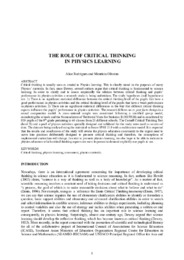| dc.contributor.author | Rodrigues, Alice | en |
| dc.contributor.author | Oliveira, Maurícia | en |
| dc.coverage.spatial | CY - Λευκωσία | en |
| dc.date.accessioned | 2016-01-21T10:29:40Z | |
| dc.date.available | 2016-01-21T10:29:40Z | |
| dc.date.issued | 2008 | |
| dc.identifier.uri | http://hdl.handle.net/10797/14478 | en |
| dc.description | Περιέχει το πλήρες κείμενο | el_GR |
| dc.description.abstract | Critical thinking is usually seen as crucial to Physics learning. This is clearly stated in the purposes of many
Physics’ curricula. In fact, since Dewey, several authors argue that critical thinking is fundamental to science
learning. In order to clarify and to assess empirically the relation between critical thinking and pupils’
performance in physics activities a research study is being undertaken. The study hypotheses (null hypotheses)
are: 1) There is no significant statistical difference between the critical thinking level of the pupils that have a
good performance in physics activities and the critical thinking level of the pupils that have a weak performance
in physics activities; 2) There are no significant statistical differences in the way that different critical thinking
aspects influence the pupils’ performance in physics activities. The research follows an ex post facto design in a
causal comparative model. A cross-national sample was constituted following a stratified group model,
considering the schools and the Nomenclature of Territorial Units for Statistics II (NUTS II) and is constituted by
889 pupils of the 9th grade pertaining to 60 classes from 21 different schools. The Cornell Critical Thinking Test
(level X) and a pool of physics activities specially designed and validated for the study were used as sources of
data. The data are being analysed using the statistical software SPSS 15.0 with a multivariate model. It is expected
that the results and conclusions of the study will awake the physics education community to the urgent need to
move into practices deliberately designed to promote critical thinking and therefore, the conceptions of
implemented curriculum will change. In order to promote physics learning, we also hope to be able to indicate to
physics educators which critical thinking aspects are most important to demand explicitly our pupils to use. | en |
| dc.language.iso | eng | en |
| dc.publisher | University of Cyprus | en |
| dc.relation.ispartof | Thinking through Physics education | en |
| dc.rights | info:eu-repo/semantics/openAccess | en |
| dc.title | The role of critical thinking In physics learning | en |
| dc.type | info:eu-repo/semantics/conferenceObject | en |
| dc.subject.uncontrolledterm | Critical thinking | en |
| dc.subject.uncontrolledterm | Physics learning | en |
| dc.subject.uncontrolledterm | Assessment | en |
| dc.subject.uncontrolledterm | Physics curricula | en |
| dc.contributor.conferenceorganizer | Department of Educational Science, University of Cyprus | en |
